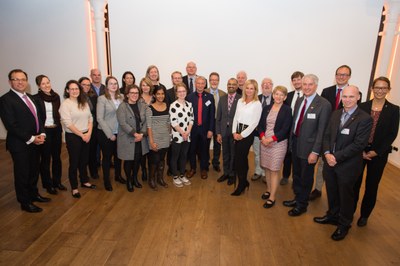Success Spanning Continents: Extension for International Research Training Group on Research into Reproduction
The International Research Training Group (IGK/GRK) “Molecular Pathogenesis of Male Reproductive Disorders” is to be granted a second phase and will receive €4.15m in funding from the German Research Foundation (DFG) for another 4.5 years.
No 131 • July 6th, 2017
Deutsche Fassung
Unwillingly childless? Male infertility can have a number of causes. The complex interaction of numerous factors is being investigated by scientists at Justus Liebig University Giessen (JLU) and Monash University Melbourne (MU) together with early-career researchers. Both universities are happy to have received recognition and acclaim by a high-ranking panel of experts of their exemplary and highly successful collaboration in the International Research Training Group (IGK/GRK 1871) “Molecular Pathogenesis of Male Reproductive Disorders”. They have now heard from Bonn that there will be a second round for the Group. The German Research Foundation (DFG) has awarded funding for another four and a half years up to 2022. DFG is to provide EUR 4.15 in total funding for 11 future projects – in the first funding period there were nine. Together with its Faculty of Medicine, Nursing and Health Sciences, Monash University is providing additional funding amounting to approximately AUD 540,000 as well as AUD 3,665,600 for scholarships.
The IRTG is the first German-Australian Research Training Group to have carried out such pioneering work and is thus blazing the trail in the context of German-Australian research relations. Lynette Wood, the Australian ambassador, has personally supported this inter-continental model project and came to Giessen in March to participate in an on-site inspection.
Congratulating the Group Lynette Wood says: “The Giessen-Monash IRTG has demonstrated best practice in how we can build partnerships, support students to develop innovative and concrete breakthroughs in research and promote the excellence of our institutions. I commend the founders on their vision to build such a strategic model for cooperation.“
Monash University is one of the leading research universities worldwide. As one of the two JLU partners in Australia, it is also a fixed point in the framework of the JLU Internationalisation Strategy. JLU President Prof. Dr. Joybrato Mukherjee joins in congratulating the Australian and German partners: “The International Research Training Group of JLU and Monash has taken hold as an impressive platform for innovative top research in which all the partners have been contributing outstanding work. It is a great pleasure for me to see that this structural framework provides talented early-career researchers with the opportunity to receive training with excellent scientific openings both nationally and internationally in the field of reproduction research and with the future chance to become established on both continents.”
Prof. Dr. Wolfgang Weidner, Dean of the Faculty of Medicine, considers funding medical top research in the framework of the International Research Training Group as a crucial cornerstone for the sustainability of the university focus “Reproductive Medicine and Biology" at JLU. "International expertise will guarantee the future of outstanding research in this important field."
The goal of the German-Australian Research Training Group is to provide co-ordinated training and to familiarise doctoral students with addressing thematic areas in male reproduction biology and reproduction medicine at JLU Giessen and MU Melbourne in order to guarantee an excellent new generation of researchers. One focus is on mechanisms with which immune cells influence male reproduction health, for example after follow-up treatment for epididymitis and orchitis, but also for testicular cancer and prostatitis. The aim is to investigate how key hormone signalling and growth factor signalling work and interact in order to control the growth and the function of male reproductive organs (testis, epididymis and prostate). Researchers are examining the pathomechanisms of fertility impairment.
In the second funding period, the Research Training Group will expand to cover eleven rather than just the initial nine projects. Each project involves several of the key topics. Each project is headed by German-Australian investigator pairs who supervise the doctoral students jointly. This tandem arrangement will be accomplished by the doctoral students carrying out research for at least a year in the laboratory of the reciprocal international project partner. This exchange visit is crucial to a doctoral degree being awarded by both universities.
The strong translational and clinical component in Giessen in combination with Monash University’s focus on the biomolecular and cell-biological aspects as well as mouse models relevant to reproduction biology offers doctoral students in the Research Training Group a unique all-round training programme. A special hallmark is the double-badged doctoral degree awarded jointly by the universities to successful candidates. The training and research programme encompasses not only molecular and cell-biological research, but also translational aspects. 15 JLU and 14 Australian scientists are involved.
The Spokesperson in Germany of the IGK is Prof. Andreas Meinhardt of the Department of Anatomy and Cell Biology at JLU; in Australia, it is Prof. Kate Loveland, Ph.D., Department of Molecular and Translational Sciences in the School of Clinical Science at Monash University, Head of the Centre for Reproductive Health at the Hudson Institute of Medical Research. She is also a Liebig Professor.
- Further information
www.uni-giessen.de/fbz/fb11/institute/anatomie/intro/mitarbeiter/profs/meinhardt
http://gepris.dfg.de/gepris/projekt/214322699?language=en
- Contacts
Prof. Dr. Andreas Meinhardt
Institut für Anatomie und Zellbiologie (Department of Anatomy and Cell Biology)
Aulweg 123, 35385 Giessen, Germany
Telephone: +49-(0)641 99-47024
Julia Volz
Head of the International Office of Justus Liebig University Giessen
Goethestrasse 58; 35390 Giessen, Germany
Telephone: +49-641 99-12130; Fax: +49-641 99-12138
Professor Kate Loveland
Monash University Melbourne
Telephone: +61 3 990 29337
Pressestelle der Justus-Liebig-Universität Gießen, Telefon: 0641 99-12041
